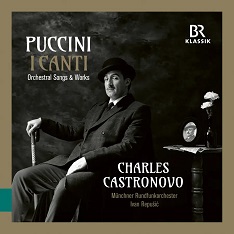Die Musikwissenschaftlerin Alexandra Wilson sieht die Rezeption Puccinis im Kontext des italienischen Nationalismus. Nach der Einigung Italiens im Jahr 1861 soll der Politiker Massimo d’ Azeglio gesagt haben: « Wir haben Italien gemacht, jetzt müssen wir Italiener machen. » Italien war seit dem Römischen Reich nie wirklich ein Land, sondern eine Anzahl von Regionen. Puccini war 13 Jahre alt, als Italien seine Einheit erlangte, in der Verdi eine Rolle spielte, aber die Nationalfrage stand weiterhin im Mittelpunkt der italienischen Politik, die Unterschiede der Regionen blieben und sind heute noch nicht überwunden. Puccinis Musik aber erlangte Erfolg in allen Teilen Italiens.
Obwohl Puccinis Opern nicht so politisch sind wie die von Verdi, dreht sich die Handlung von Tosca um die historische und politische Erzählung des italienischen Nationalismus. Tosca spielt in Rom während der letzten Tage der brutalen neapolitanischen Herrschaft. Cavaradossi und Angelotti werden als Märtyrer für die Sache des italienischen Nationalismus dargestellt,
Puccinis Lieder sind so unterschiedlich wie die Themen seiner Opern. Natürlich gibt es darunter auch einfache Liebeslieder wie ‘A te’, aber ‘Inno a Roma’, ‘Inno a Diana’, ‘Avanti, Urania!’, ‘Dios y Patria’ oder das verlorengegangene ‘I figli dell’Italia bella’ haben, wenn auch keine politischen so doch eindeutig nationalistische Züge.
Dieses Album enthält Lieder, die Johannes X. Schachtner orchestriert hat, und wenn ich auch nicht immer Klavierlieder in Orchestrierungen mag, so gibt es hier nichts, was mich stören würde, weil der Arrangeur eine typische Puccini-Orchestrierung bewerkstelligte.
Der Tenor Charles Castronovo singt mit kultivierter Stimme, Wärme und ohne Pathos. Mit feiner Phrasierung, angenehmen Kontraste in Farbe und Dynamik gibt er den meisten Stücken eine heroische Qualität, die durch die baritonale Färbung unterstrichen wird.
Er wird vom Münchner Rundfunkorchester unter Ivan Repusic bestens unterstützt. Repusic dirigiert das Capriccio sinfonico mit seinen Melodien aus Opern, darunter La Bohème, kraftvoll und farbig.
Sehr schön und tief empfunden erklingt Crisantemi. Der Dirigent trifft den melancholisch-nostalgischen Ton dieser Musik, die Puccini im 4. Akt seiner Oper Manon Lescaut wiederverwenden sollte.
Musicologist Alexandra Wilson sees Puccini’s reception in the context of Italian nationalism. After the unification of Italy in 1861, the politician Massimo d’Azeglio is said to have said: « We have made Italy, now we must make Italians. » Italy had never really been a country since the Roman Empire, but a number of regions. Puccini was 13 years old when Italy achieved its unity, in which Verdi played a role, but the national question was still at the center of Italian politics, the differences between the regions remained and have not yet been overcome. Puccini’s music, however, achieved success in all parts of Italy.
Although Puccini’s operas are not as political as Verdi’s, the plot of Tosca revolves around the historical and political narrative of Italian nationalism. Tosca is set in Rome during the last days of brutal Neapolitan rule. Cavaradossi and Angelotti are portrayed as martyrs for the cause of Italian nationalism,
Puccini’s songs are as varied as the themes of his operas. Of course, there are also simple love songs such as ‘A te’, but ‘Inno a Roma’, ‘Inno a Diana’, ‘Avanti, Urania!’, ‘Dios y Patria’ or the lost ‘I figli dell’Italia bella’ have, if not political, then clearly nationalistic traits.
This album contains songs orchestrated by Johannes X. Schachtner, and even if I don’t always like piano songs in orchestrations, there is nothing here that would bother me, because the arranger has achieved a typical Puccini orchestration and color.
The tenor Charles Castronovo sings with a cultivated voice, warmth and without pathos. With fine phrasing, pleasant contrasts in color and dynamics, he gives most of the pieces a heroic quality, which is underlined by the baritonal coloring.
He is well supported by the Munich Radio Orchestra under Ivan Repusic. Repusic conducts the Capriccio sinfonico with its melodies from operas, including La Bohème, powerfully and colorfully.
Crisantemi, whose melancholy, nostalgic tone is a fitting match for this music, which Puccini was to reuse in Act 4 of his opera Manon Lescaut, is very beautiful and deeply felt in Repusic’s excellent interpretation.
https://www.pizzicato.lu/charles-castronovo-puccini-would-have-loved-schachtners-orchestra-arrangements/


















